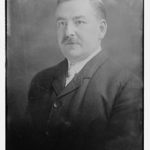The American Commission on Irish Independence emerged in spring 1919 from the failed New York City meeting between representatives of the just-concluded Irish Race Convention and President Woodrow Wilson.
Convention leaders appointed the three-member delegation to travel to Paris to support the cause of Irish self-government at the post-war peace conference. “They were a distinguished group,” Whelan noted.1
Frank P. Walsh: a nationally-known lawyer, he had served on the National War Labor Board and War Labor Conference Board. Named chairman of the commission, Walsh became its “most important and dynamic member.”2
Edward F. Dunne: another lawyer and former judge, he had served as Chicago mayor, then Illinois governor. Along with several Irish-American U.S. senators, Dunne was the highest elected official identified with the Irish nationalist movement in America.3
Michael J. Ryan: a former Philadelphia city solicitor and public service commissioner, he had been president of the United Irish League of America. Ryan publicly distanced himself from Irish Parliamentary Party support for the British during the war and repudiated home rule politicians. 4
At the March 4 New York meeting with Irish nationalists, Wilson banned New York Supreme Court Judge Daniel F. Cohalan, a longtime political nemesis who had opposed his 1916 re-election. None of the three commission members carried such political baggage to Paris. “Consequently, the group had a national prominence in orthodox politics and were of good character.”5
The trio’s mission was threefold: obtain safe passage to Paris for Éamon de Valera, Arthur Griffith and Count Noble Plunkett; plead the Irish cause at the peace conference on their behalf if such passage was denied; and secure U.S. recognition of the Irish republic. In the Kentucky Irish American, Walsh was quoted:
“The committee is going to France as American citizens, holding no allegiance, material or spiritual, to any other nation on earth, but imbued with the necessity of extending the principals of free government to Ireland, which is the typical small nation of the world, being deprived of the right to determine for itself the form of government under which it shall exist.”6
The commission reached Paris on April 11, 1919. In a front page-story in The Irish Press, Philadelphia, Dunne recalled that six weeks earlier in New York Wilson told the delegation that he was not prepared to say whether Ireland qualified for self-determination.
“We then informed the president that we were in no hurry and were prepared to wait for his answer, and were even willing to journey to Paris to obtain it. President Wilson now has had sufficient time to reflect. We have come to Paris for his answer.”7
More on the American Commission on Irish Independence in future posts.
- Whelan, Bernadette, United States Foreign Policy and Ireland: From Empire to Independence, 1913-29. Four Courts Press, Dublin, 2006, p. 205.
- Carroll, Francis M., “The American Commission on Irish Independence and the Paris Peace Conference of 1919,” in Irish Studies in International Affairs, Vol. 2, No. 1, 1985, p 106.
- Ibid.
- Ibid, p. 107.
- Whelan, p. 205.
- Kentucky Irish American, April 19, 1919, p. 1
- The Irish Press, Philadelphia, April 19, 1919, p. 1.


